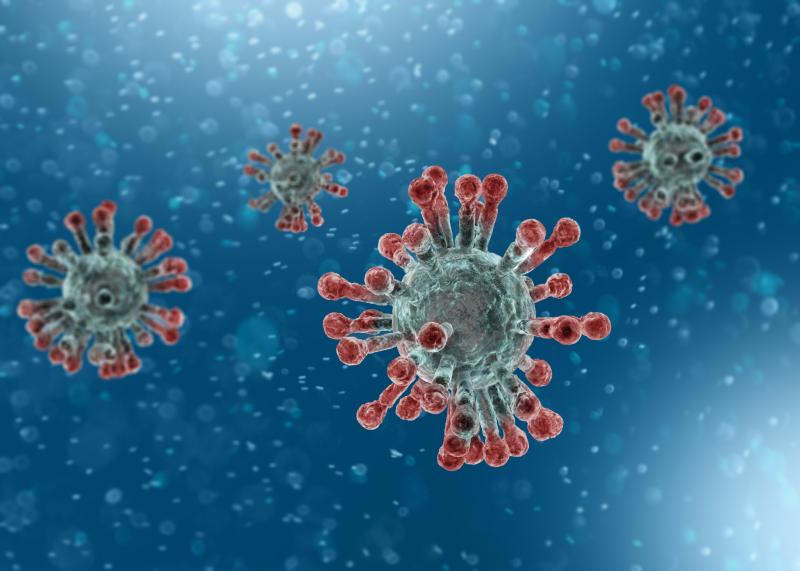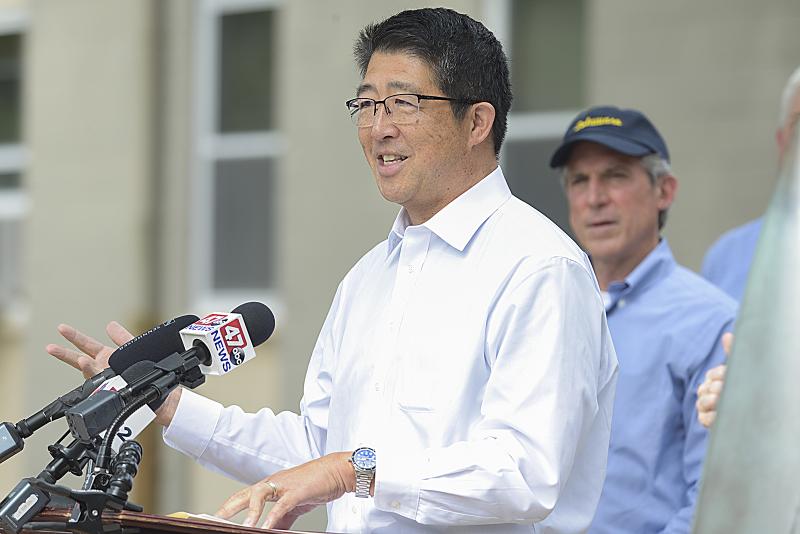State officials have announced the first long-term care facility coronavirus-related death in Delaware and the first outbreak of positive cases in such a facility.
The death of an 86-year-old male resident of Little Sisters of the Poor Jeanne Jugan Residence in Newark was reported March 26 to the Division of Public Health. The individual had underlying medical conditions.
Six residents of the Newark nursing home have also tested positive for COVID-19, the Division of Public Health reported. Officials say they are actively working with the facility to ensure resident and staff safety.
Earlier in the day Division of Public Health officials announced a 66-year-old Sussex County man hospitalized out-of-state was the first Delawarean to die from COVID-19. The man had underlying health conditions, and he was critically ill.
“Our hearts go out to the family and friends of the gentleman who died, as well as to all who have been diagnosed with coronavirus disease,” said Division of Public Health Director Dr. Karyl Rattay in response to Delaware’s first death.“This is a tragic reminder that that this disease can be fatal. We need to make sure that we are protecting vulnerable persons from this disease, particularly older individuals and those with chronic health conditions. This reinforces why it’s so important for everyone to stay home - especially those who are ill with any symptoms including fever, cough, body aches, sore throat, shortness of breath and even stomach aches, nausea and diarrhea.”
Although one public health official said the first Delawarean to die was in a Maryland hospital, Rattay quickly added that they cannot confirm what state or hospital the man was in, or his hometown. Rattay could not say if the man contracted the virus in Delaware, and she could not say what his underlying health conditions were because the information is protected by federal law. The man, however, is counted as a Delaware death only because he is a Delaware resident, she said.
Rattay said a breakdown of positive and negative tests is difficult because of the number of tests that have been done by the DPH lab and commercial labs. So far, she said, 2,617 samples have been collected, but that does not include emergency rooms and other healthcare facilities. The DPH lab has done 639 tests with 48 positives and 591 negatives, she said.
Beebe Healthcare announced its first COVID-19 patient March 25, on the same day public health officials said four of the first patients diagnosed with the disease have fully recovered.
“Patients are considered fully recovered seven days after the resolution of their symptoms,” said Jen Brestel, spokeswoman for the Division of Public Health. “Three days after symptoms resolve, they are no longer required to self-isolate at home; however, they must continue to practice extreme social distancing for the remaining four days.”
Rattay said two of the patients who recovered are a husband and wife who self-isolated at their New Castle home, and they agreed to allow Rattay share their story. “He had a fever for one day and some body aches,” she said.
The state total more than quadrupled in a week, reaching 143 March 26 with 91 cases in New Castle County, 19 in Kent and 33 in Sussex County. Of the 130 cases, 63 are male and 67 are female. The individuals range in age from 1 to 90. In a breakdown of cases by age, officials said, the age bracket with the most cases is 18-49 with 68. The next highest is ages 50-64 with 38, and there are 34 cases of people 65 or older. Rattay said there is a 1-year-old pediatric case, and two cases in ages 5-17.
Fifteen individuals are currently hospitalized; seven are critically ill. Two residents are hospitalized out of state, officials said.
The source of exposure for many of these positive cases is unknown, which indicates community spread of the virus is occurring in the state.
Beebe Healthcare announced its first COVID-19 patient March 25.
“We can confirm that we are treating effectively a confirmed COVID-19 patient at our Margaret H. Rollins Lewes Campus,” said Christina Deidesheimer, director of marketing communications for Beebe Healthcare. “People are being treated in Sussex County both on an in-patient and out-patient basis for COVID-19. Some of them are and will be treated at Beebe Healthcare. The numbers will fluctuate daily.”
While testing has increased across the state with public and private labs doing tests, results are taking five to seven days to report in some cases. Stacey Hofmann, spokeswoman for DPH, said the public health lab prioritizes specimens for hospitalized patients, healthcare staff who are symptomatic, critically ill patients, and situations where there are potential outbreaks in healthcare and residential facilities, and other high-risk settings.
“The reason the DPH lab is prioritizing these specific groups is because it is important that we get results back as soon as possible for these high-risk groups,” she said.
Beebe Healthcare is developing technology for in-house testing for COVID-19 in an effort to speed up test results.
“We are working on technology updates and upgrades that will allow us potentially to do this kind of testing without a kit; just a swab, then we do it here in our hospital here in Lewes rather than sending those kits to North Carolina or someplace else,” said Beebe Healthcare President and CEO Dr. David Tam.
If Beebe can get its own testing capabilities up and running, Tam said, tests that take four to five days for results could be done in about four hours. As more testing occurs throughout the country, Tam said, he expects testing turnover times to become even slower, taking five to 10 days.
By establishing local testing, Tam said, people can know much faster if they’re infected and what treatment, if any, is needed. Faster turnaround for tests also conserves the hospital’s limited supply of personal protective equipment, Tam said. If staff is treating a patient for respiratory issues, they’ll likely wear the gowns and masks until test results come back, he said.
“If I can cut that down to four or five hours, then we will have a better idea how to use that very, very critical equipment,” he said.
To conserve the limited number of test kits available, Tam said, Beebe has ramped up its screening process. To be tested, a person must get a referral from their primary care physician. If they do not have a primary care physician, they are asked to call a COVID-19 hotline, where they will be screened. If a test is required, an appointment is set up for a test at one of Beebe’s testing sites. A third site went online March 25 in Georgetown.
“That gives us the maximum use of those testing kits,” Tam said.
If a test comes back positive and the person is not showing symptoms, the patient is directed to work with their primary care physician on a plan to manage their situation, including self-isolation.
“Just because you have positive findings doesn’t mean that you need to be hospitalized,” Tam said.
Even though the number of Sussex County cases is now at 24, as of March 25, Tam said Beebe has already developed a surge capacity plan. He said staff is analyzing data to determine when patient census is likely to increase.
“There are ways to do that kind of predictive modeling, and we’re working on that with people at the University of Delaware and the state,” he said. “I think Beebe is ahead of the curve. I need to know at what point do I need to really ramp up our resources and have the right amount of ventilators and the right amount of ICUs so that we can take care of that surge when it happens.” Having that data will be valuable, Tam said, in determining if Beebe can match the surge in its existing hospital or if they need to find extra space, such as using the cafeteria.
“The health system of Beebe Healthcare is working very aggressively to make sure that we are prepared for every eventuality,” Tam said.
To ensure the hospital is a safe place, Tam said, all Beebe employees are screened before entering the building, including answering questions and having their temperature checked.
“We don’t want healthcare workers who are infected to come in and potentially spread virus to everybody else,” he said. “We are doing everything we can to take care of the healthcare facility.”
To keep the community informed, Beebe plans to host virtual town hall meetings starting next week. Tam said they will be live, but also recorded for people to watch at their leisure. More information will be released in the coming days.
Beebe is seeking donations of critical medical supplies, including unused face and surgical masks, especially N95 masks; eye protectors: safety goggles, safety glasses, clear face shields; surgical and medical gloves; medical garb, suits, scrubs and isolation gowns; cleaning and sanitizer solutions such as alcohol wipes/pads, bleach wipes, sanitizing wipes; hand sanitizer, including hand sanitizer bottles/pumps/spray bottles; brown paper bags and lunch bags; and alternative respirators that OSHA has given permission to use in healthcare settings during this historic pandemic.
For donations of items or supplies, call 302-645-3337. For monetary donations, call Beebe Medical Foundation at 302-644-2900.
Those who believe they need to be tested for COVID-19 should contact their primary care physician. Those who do not have one should call Beebe Healthcare’s COVID-19 hotline at 302-645-3200. The hotline is in operation from 8 a.m. to 6 p.m., seven days a week.

























































